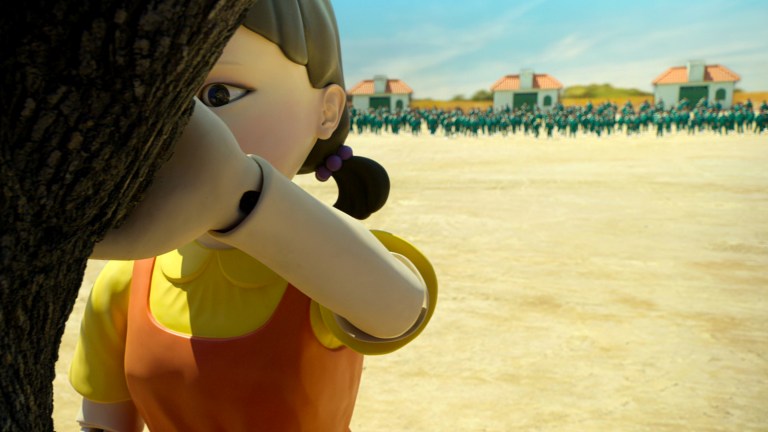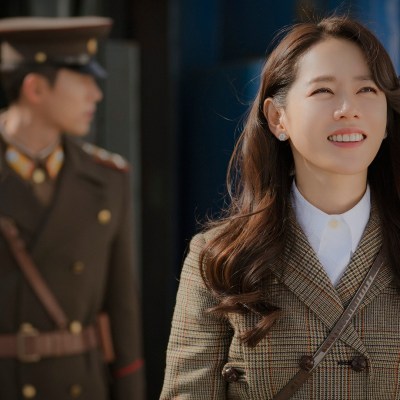Squid Game Doesn’t Waste Its Brutal Premise
Squid Game, Netflix's new series about a group of people competing in a deadly game for money, knows what it's doing with its well-worn tropes.

This Squid Game review is based on the first two episodes. It contains minor spoilers.
Squid Game uses a premise we’ve all seen before: People are thrown into an artificial arena where they must fight for their lives. In Netflix‘s new series, the arena is a massive, secret compound; the competition is a series of children’s games; and the people are 456 contestants who desperately need the ₩45.6billion ($39 million) prize money more than they need the illusion of safety the outside world periodically provides. Some competitors, like central protagonist Ki-hoon (Lee Jung-jae), have fallen into debt, compounded by a gambling addiction and a loan shark looking to collect. Others, like Sae-byeok (Jung Ho-yeon)—a North Korean defector trying to help her parents escape to the south—need it to reunite their family. All have been carefully chosen by the game’s masked, seemingly unfeeling minder because they feel the chance at the prize money is worth more than their own lives.
Squid Game utilizes well-worn tropes, but there’s nothing inherently wrong with that—especially when the story template continues to hold such allegorical value and when the series expresses them so well. At least in its first two episodes, Squid Game isn’t afraid to follow its premise through to its inevitable, ruthless conclusions. The contestants only recognize the true horror of the game when they begin a deadly game of Red Light, Green Light, played out in a bright sun under which the characters—and the viewers—have nowhere to hide. Later, we see the logistics of the aftermath, as the anonymous workers who man the facility burn the bodies of the losers, making no distinction between the dead and the dying.
If watching people slaughtered in droves is a tough sell in our current world climate, that’s understandable—however, unlike lesser examples of this subgenre, Squid Game‘s violence has a sharply defined point, emphasized by writer-director Hwang Dong-hyuk’s decision not to set this story in some near-future dystopia, but in the reality we all currently reside. These characters are not looking to feed their family and neighbors in Hunger Games‘ District 12 or finding themselves trapped in Doctor Who‘s Dalek-controlled Game Station. Squid Game is firmly grounded in our real world, represented through various neighborhoods in Seoul, which serves to make it that much more horrifying and its point that much more articulate. Yes, the game is horrific, but that horror is contextualized in reality; it is only possible because the conditions outside of the arena allow it to, and Squid Game never misses an opportunity to make that point.
It helps enormously that, while Squid Game is critical, it is not overly cynical. Sometimes, characters make the cutthroat decision. Other times, someone reaches out a hand to help a stranger. Usually, people are driven by the love they have for their family—and we actually get to see that love depicted, as we spend time with these characters in their lives outside of the competition. This isn’t a story in which humanity is doomed because of its inherent greed or selfishness, though those traits can certainly come into play; it is a reality where people do desperate things because they are in desperate situations, and the system preys on that vulnerability for profit and in disgusting demonstrations of power. While the game-makers do not value human life, it’s clear that that story itself does—a vital narrative distinction.
Interestingly, Squid Game gives its characters a level of agency usually eschewed in the subgenre. Unlike Hunger Games or Battle Royale, the competitors in this game choose it—first, without full knowledge of the stakes and, then, with their eyes wide open. The story spends precious narrative time contextualizing the characters’ choice to opt in, and doesn’t really judge them for it, even when that choice means condemning others. Squid Game keeps its harshest critiques on the people with the power.
Having only seen the first two episodes of the eight-part season, it’s impossible to draw definite conclusions about Squid Game‘s overall effectiveness. In the second episode, Squid Game offers a respite from the tightly-controlled horror of the arena in the form of a young cop searching for his brother, whom he believes to be a contestant in this secret game. Depending on how the subplot develops, it could undermine some of the the series’ ambitions to depict the inescapable horror of capitalism. However, these first two episodes subvert expectation often enough to allow for a different outcome.
Inevitably, Squid Game‘s success hinges on what it chooses to do with the sharp, specific social critiques and sympathetic characters it effectively presents in its opening hours. Will the series continue to align the viewer with the desperate contestants or twist to remind us what we have in common with the game-makers, watching for sport? Will it choose to reveal the game’s purpose and those who designed it—and, if so, to what end? Are happy endings possible in this world that, like our own, puts so many in no-win situations and still dares to pretend they have a choice? Can justice exist in a society so unequal in its doling out of power? Squid Game doesn’t offer an escape from the horrors of the real world; within its limitations as a fictional drama, it gives us something far rarer: an affirmation that they exist, and that we’re not alone in finding them nightmarish.
Squid Game hits Netflix on Friday, September 17th.


